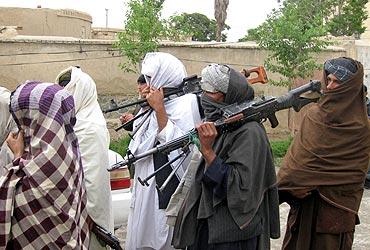
Tahir Ali assesses the strengths, capabilities and leadership of the Haqqani network, one of the dreaded terror groups operating on both sides of the Durand Line
The US has asked Pakistan to take on the Haqqani network, failing which it will take unilateral action against the terror group. Pakistan is unmoved by this demand and both the military and political leadership have strongly opposed the US suggestion saying that under the prevailing circumstance it is not in Pakistan's interests to start a military operation in North Waziristan.
During the 10 years since 9/11, Pakistan has adopted a 'yes' policy towards Washington, DC, and there is hardly an incident of Pakistan responding to America's demand in the negative.
The question then arises: why is Pakistan not ready to take on the Haqqani network? Does Pakistan see its future in Afghanistan's politics through the group, or is the network too dangerous to be taken on?
No doubt, the group could serve Pakistan's interests inside Afghanistan in the future, but at the same time, any military action against the Haqqani network would turn not only the tribal belt but also the settled areas of the country into a battlefield.
The Haqqanis are much respected among the jihadists on both sides of the border. A source said that one phone call from the Haqqanis would make both the 'good' and 'bad' Taliban factions join hands to wage a jihad against Pakistan.
So let's take a look at the strengths, capabilities and leadership of the network which make it one of the dreaded terror groups operating on both sides of the Durand Line.
...
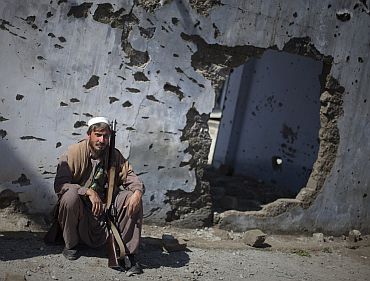
The Haqqani network has more than 12,000 well-trained fighters. These include experts in guerilla warfare; explosives and bomb-makers; snipers; suicide bombers; and teachers to indoctrinate the young walking-bombs.
The group is also fully equipped with all the modern weaponry needed for guerrilla warfare.
The network is very strong on both sides of Pakistan-Afghanistan border, and its control centre is reportedly located in North Waziristan.
Until recently, the group had three markaz (centres): Miranshah Bazaar Markaz (consisting of a seminary and compound), Sarai Darpakhail Markaz and Danday Darpakhail, where its founder Maulana Jalaluddin Haqqani's family lives.
Due to the increased drone strikes in North Waziristan, the terrorist organisation shifted its base from these sites to other tribal areas where it is strong, like in Kurram agency, while it has retained some cadres in South Waziristan, Bajaur, Mehmand and Orakzai.
In Afghanistan, the network controls Khost, Paktika, Paktia, Logar and Ghazni provinces of Afghanistan and has now extended its activities to Kabul and its surroundings.
The group's strength and reach are evident from the May 13 attack on the US embassy, North Atlantic Treaty Organisation headquarters and other buildings in Kabul, according to US officials.
...
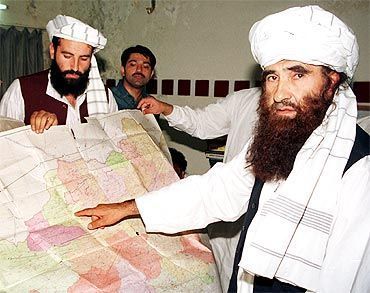
The founder of the terror group is Jalaluddin Haqqani. The jihadist, in his early 60s, belongs to the Zadran tribe that lives on both sides of the Durand Line and is included in Afghan Taliban's main shura.
Jalaluddin was born in Srani in Garda Tseray district of Paktia, and has two wives: one from the Zadran tribe in Khost, while his second wife is Arab. The ties with Arabs and Pashtuns through marriage makes his position strong both among both Arab and Pashtun terrorists.
Haqqani started his jihadi career during the Soviet occupation of Afghanistan, and soon became a prominent figure.
During the '90s he grew close to the Al Qaeda. Haqqani had spent a long time in North Waziristan, and established a seminary in Danday Darpakhail village in 1980.
Almost all the seminarians of that madrassa are affiliated with jihadi activities. When the Mullah Omar-led Taliban emerged in the 1990s, Haqqani initially maintained his distance but later joined them as minister for tribal affairs.
After the fall of the Mullah government following the US attack in 2001, Haqqani shifted to North Waziristan where he reunited with his men to wage a war against the NATO forces.
Haqqani has lost a number of his family members. In July 2008, his son Muhammad Omer Haqqani died fighting in Satto Kandao area in Paktika province. Two months later, his Pashtun wife was killed during a US drone attack inside the Pakistani tribal area.
During the same attack Haqqani also lost eight grandchildren, a sister and her husband. In February 2010 Haqqani lost his other son, Muhammad Haqqani, in another drone strike in North Waziristan.
Today he is the spiritual leader of the network, while his son Sirajuddin Haqqani, also known as Khalifa, leads the group. At the moment, no one knows the whereabouts of the senior Haqqani.
...
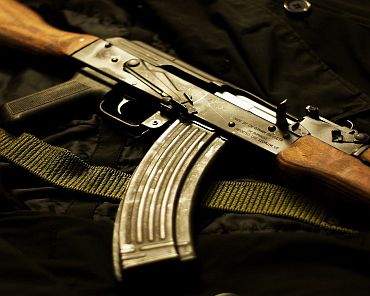
Sirajuddin, who has studied at his father's seminary in Danday Darpakhail, is on the most-wanted list of the US, and has a $5 million reward for his capture.
Badaruddin Haqqani, Sirajuddin's younger brother, monitors the network's terrorist affairs. With the help of Maulvi Sangeen, he has become a major orchestrator of some of the most lethal terror strikes against the coalition and Afghan forces in Eastern Afghanistan.
On May 11, 2011, the US State Department named Badaruddin on its list of global terrorists.
Sangeen, hailing from the Haqqanis' tribe Zadran, is a dreaded commander of the network, and organises group training in terrorist attacks and in planning strikes. In the past, he is believed to have abducted an American soldier.
He has very close ties with Pakistan-based terror outfits, specifically the dreaded Tehrik-e-Taliban Pakistan. Hakimullah Mehsud, the TTP head, started his career under Sangeen's command in Paktika.
Sangeen was also recently added to the US list of global terrorists by the US.
Nasiruddin Haqqani, another son of Jalaluddin Haqqani, is known for financing the network. His mother is an Arab, which makes it easy for him to travel to Arab countries for fund-raising.
He has visited Saudi Arabia and the United Arab Emirates for this purpose. Of late he has been operating out of the bordering areas between Pakistan and Afghanistan.
Nasiruddin was very close to senior Al Qaeda commander Abu Al-Libi, who was killed in a drone attack in 2008. His name was also included in America's most wanted list in July 2010.
...
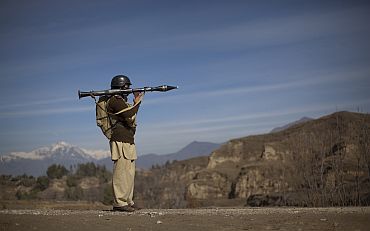
Khalil Haqqani, younger brother of Jalaluddin, is another important commander of the network. He is attached to the financial arm of the terror outfit, and is the go-between with Arab terrorists.
Khalil has been on the US State Department's global wanted terrorist since February 2011.
Jan Baaz Zadran is another important figure in the network. He is not a skilled fighter but given his financial management skills, he deals with the group's economic affairs, procuring arms etc.
Baaz, who hails from the same village as the Haqqanis, is Sirajuddin's most trusted man and enjoys considerable power in the group. In Pakistan's tribal area almost all the terror groups, whether 'good' or 'bad', are loyal to the Haqqani network.
Among those who show loyalty to the Haqqani network include Hafiz Gul Bahadur, head of all the Taliban factions in North Waziristan; TTP head Hakimullah Mehsud; Fazal Saeed Haqqani, head of Tehrik-e-Taliban Islami Pakistan (TTIP) Kurram Agency; and Mullah Nazir, head of all the Taliban factions with a Wazir tribal background in South Waziristan .
When the Taliban from different Pakistani factions cross over to Afghanistan to wage jihad, all of them fight under the Haqqani network's umbrella. Thus, the Haqqani network keeps Pakistani Taliban as a unit inside Afghanistan.
Naturally, all these Pakistani Taliban factions would react if Pakistan were to launch a military operation against the Haqqani network.